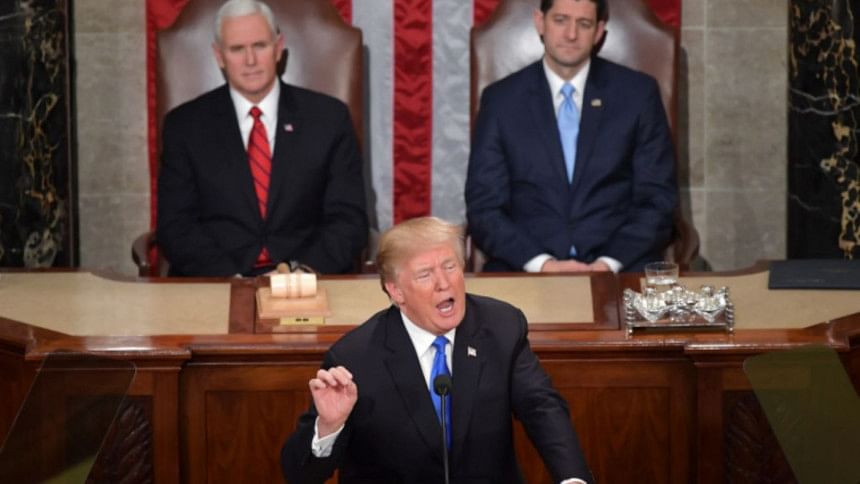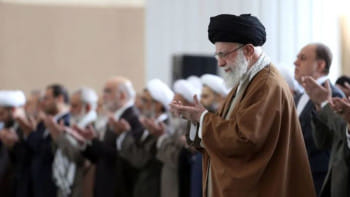When even Trump moves to the centre

Donald Trump's first State of the Union speech as president sounded presidential. On Tuesday night, he sounded more like the Republican candidate who took a combative and aggressive stance to win the election in 2016. Like a true Republican, Trump readily invoked patriotism and the American flag repeatedly in his speech and ended it with a Reaganesque salute to American exceptionalism and exceptional Americans. Looking forward, he laid out his agenda and invoked the ideal of bipartisanship.
He also upheld the time-honoured tradition of remaining vague about the means to achieve his ends. But even though Trump has learned to speak (or to read a script) like a trained politician, the world is not yet ready to listen to him as a politician. Therefore, Trump's speech may come as a heartbreak for many who loved him primarily because of his no-holds-barred comments, primarily because he did not make compromises, primarily because he was not a politician.
But did Trump say enough to convince his admirers that America is already becoming great again? He sure did say a lot. According to William Galston at the Brookings Institution, much of his victory lap on Tuesday night was not misplaced either. The economy is growing vigorously. Wages are finally rising. Corporations are reinvesting in America. The president has achieved massive tax cuts, significant deregulation, the confirmation of constitutionalist judges and the repeal of the individual mandate imposed by Obamacare (even though he failed to gut the Act in its entirety).
As all presidents presiding over a good economy do, Trump took credit for all the good that is going on even though he inherited much of it. The factsheets do read that African-American unemployment rate is at a record low of 6.8 percent and its steady decline since 2010 is something Trump could (and did) easily brush under the carpet. He could (and did) also keep silent about the growing deficit that will exceed USD 1 trillion thanks to his policies. And no matter how hard the opposition tries to expose the dirt, the president simply has a bigger megaphone than them and is well-versed in drowning out his naysayers.
That is why I say that Trump's speech would have been successful only if his base was establishment conservatives. His speech proved (again) that he has accepted the agendas of the social conservatives—constitutionalist judges, school choice, religious liberty, opposition to abortion—and of economic conservatives—tax cuts and deregulation.
But the fact of the matter is that Trump's base is hardly centrist enough to be swayed by these achievements. The only thing his supporters care too much about is something that he spoke too much about. The only policy programme of no substance he extensively described in his speech was his plan on immigration. The new Trump plan would cut legal immigration and spend about USD 25 billion on border security and a wall. In exchange, the Trump administration has decided to support amnesty and citizenship for an estimated 1.8 million DREAMers.
Unfortunately, few Democrats and independents view the president's proposal as fair because it deals a blow to both legal immigration (a major source of American prosperity) and makes the black hole of public debt even larger. Therefore, if it was Democrat or independent/centre-left support that Trump had sought, his speech missed that target by far.
Instead, it has invited angry reaction from hardcore conservatives. Senator Ted Cruz (Trump's opponent in the Republican primaries) has already claimed that Trump's proposal is inconsistent with his promises. Breitbart News, the right-wing outlet that strongly contributed to the election of Trump, has already attacked the president for his amnesty proposal and gave him the nickname "Amnesty Don." Heritage Action, the Heritage Foundation's political outreach arm, condemned President Trump's amnesty proposal very harshly in order to maintain its ties to the administration. Using the State of the Union address to reiterate a message that had already disheartened so many of Trump's supporters and well-wishers has only made sure that the groups that primarily rallied for Trump because of his anti-immigration stance will now be disaffected and refrain from voting for him (and his party) in the upcoming elections.
Trump has started to find his footing in the euphemistic vernacular of Washington politics. His speech, in the interest of protecting his base, should have been even heavier on propaganda and sweet talk while keeping the policy cupboard even barer. Trump's base tuned into the speech for reassurance on MAGA but Trump, mistakenly, has given them something extra: a taste of the swamp that they had elected him to drain.
This may become a problem for the entire Republican Party in the upcoming midterm elections. Tuesday's State of the Union address has Democrats more fired up than ever and because of Trump's new centre-right avatar, the Republican Party may lose the wildcard of the anti-establishment "silent majority."
Anupam Debashis Roy is a student of international affairs and economics at Howard University.

 For all latest news, follow The Daily Star's Google News channel.
For all latest news, follow The Daily Star's Google News channel. 



Comments